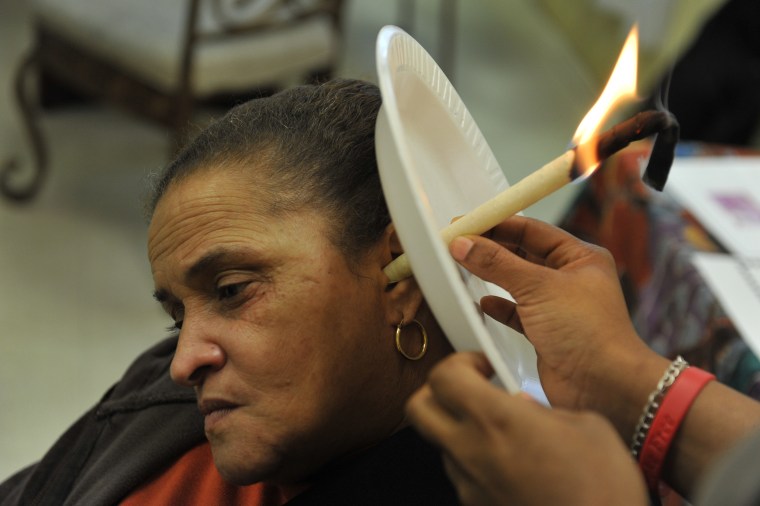Nearly 40 percent of Americans incorrectly believe that alternative medicine can cure cancer, a new study out Tuesday finds.
The survey finds that 38 percent of people who care for cancer patients believe in alternative therapies, and 22 percent of cancer patients or former cancer patients believe in such remedies.
That’s despite overwhelming evidence that such treatments not only do not work, but can shorten the lives of cancer patients.
The American Society of Clinical Oncology commissioned The Harris Poll to survey more than 4,800 people, including 1,000 cancer patients or cancer survivors. They found 39 percent of them believe alternative therapies alone -- such as enzyme and oxygen therapy, diet, vitamins, and minerals -- can cure cancer.
They’re wrong, the evidence shows.
“There’s no question that evidence-based cancer therapy is necessary to effectively treat the disease,” said ASCO Chief Medical Officer Dr. Richard Schilsky.
“The vast majority of alternative therapies either haven’t been rigorously studied or haven’t been found to benefit patients. When patients are making critical decisions about which cancer treatments to undergo, it is always best to follow the evidence from well-designed research studies.”
Younger people were more likely to believe in “natural” or alternative therapies, the survey found. It showed that 47 percent of people aged 18-37 and 44 percent of people 38-53 believed in alternative medicine, compared to 21 percent of people 72 and older.
And 83 percent of those surveyed supported the use of medical marijuana, which has been shown to help with the nausea caused by some cancer treatments but which has not been shown to help cure the disease.
Cancer is the No. 2 killer of Americans, right after heart disease. The American Cancer Society projects that 1.7 million people will be diagnosed with cancer in 2018, and 600,000 will die of cancer.
But death rates from cancer have been falling steadily. The cancer death rate fell 1.7 percent from 2014 to 2015, the American Cancer Society says, and the cancer death rate has fallen 26 percent since 1991.
Standard treatments including surgery, chemotherapy and newer treatments such as immunotherapy have all contributed to the decline.
But people really want to believe there’s something better out there, said Dr. Skyler Johnson of the Yale Cancer Center, who has worked on a team conducting studies on alternative cancer treatments.
“Despite our recent studies showing there is an increased risk of death with alternative therapies, there still quite a few people who are influenced by this misinformation,” Johnson told NBC News.
“People feel like these types of therapies align with their personal and philosophical beliefs about managing their health. They want some form of autonomy and they want to make their own decisions about treatment.”
Johnson’s team reported in July that cancer patients have unrealistic views of the value of complementary therapy, with two-thirds believing it will help them live longer and a third thinking it is a cure.
Doctors and other health experts need to do more to educate patients, especially with so much misinformation online, Johnson said. “I am not a fan of censorship but we need to do more in the area of consumer protection for cancer patients. They are a particularly vulnerable group of patients,” he said.
The National Institutes of Health’s National Center for Complementary and Integrative Health has an app for people who want to check out the research on alternative therapies.
Doctors and the Food and Drug Administration have warned for years that unproven treatments may lure patients away from legitimate therapy that can save their lives.




